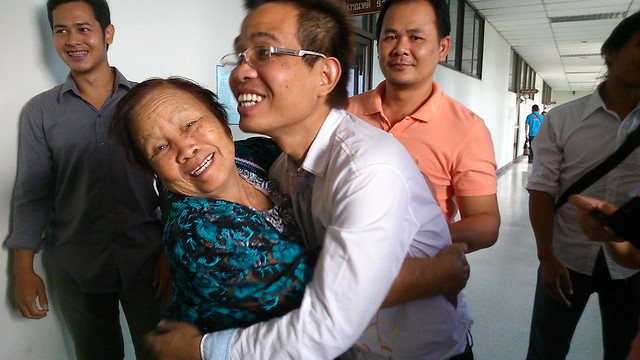The Appeal Court on Wednesday affirmed the decision of the Court of the First Instance, finding Surapak P. not guilty of creating a lèse majesté Facebook profile, parodying the oath of succession of the monarch, and of posting defamatory messages against the King on the Facebook profile.
Surapak P., a programmer, was charged under Article 112 of the Criminal Code, the lèse majesté law, and Article 14 of the Computer-related Crime Act 2007, for importing illegal messages into a computer system.
Surapak hugs his mom after learning that he was acquitted.
The Facebook profile’s name in Thai parodies the royal oath of succession, "I shall reign with righteousness for the benefit and happiness of the Siamese people." The word “coup” is inserted into the phrase as a parody.
The messages posted on the profile talked rudely about the King, the 19 September 2006 coup and the now-defunct pro-establishment “yellow-shirt” protesters.
The Appeal Court reasoned that the prosecution evidence was not strong enough. The defendant was acquitted after being given the benefit of the doubt.
The Appeal Court said, in the Thai context, this kind of case is very sensitive because it touches Thai people’s hearts and is also related to national security. Law enforcement agencies should exercise the law carefully and respect the rule of law. The defendant should be prosecuted only with proof beyond doubt that he committed the crime.
“The fact that the defendant has a political attitude differing from a political group which explicitly expresses their loyalty to the King cannot be a reason to generalize that the defendant committed defamation against the King or the monarchical institution as the plaintiff complained. Otherwise, prosecution of the law in possible breach of the rule of law may create the opposite effect, namely ruining faith and respect in the monarch. People who are loyal to the King in the right way will not wish to see this kind of effect.”
The court added that “Since this case is related to defamation of the King, social sanctions and social stigma toward the defendant would be as severe as a criminal prosecution. There is a need to be even more careful in examining the evidence than in general criminal cases.”
Surapak said on Wednesday he hoped that his case will set a standard for Computer Crime cases and will bring about a change in the police procedures for using evidence.
In mid-2011, a royalist Internet user tipped off the Technology Crime Suppression Police Division through the Division’s website that they suspected Surapak was the owner of the email address
[email protected], which was allegedly used to create a Facebook profile named “I shall reign with XXXX.” He also provided the police with Surapak’s address.
Later, another Internet user filed a police complaint against the owner of the dorkao email who he suspected to be the creator of the Facebook profile. He reasoned that when this address was searched on Facebook, one of the search results was a Facebook profile named “I shall reign with XXXX.” This made it a formal case and led to the arrest.
In September 2011, the Technology Crime Suppression Police raided Surapak’s apartment and confiscated a notebook computer and several other computer devices.
Surapak was repeatedly denied bail.
The profile was still active after he was arrested, according to a Prachatai reporter.
The public prosecutor showed to the Court of First Instance that the forensic police found temporary files indicating use of the dorkao email address and the use of the profile as owner of the account. However, Traces of the lèse majesté messages posted by the account were not found on the computer.
Surapak’s lawyer, Thitipong Srisaen, successfully proved to the court that the prime evidence, the defendant’s computer, was contaminated when in the care of the police. Importantly, the temporary files were unnaturally stored in the wrong place.
The Court of First Instance ruled in October 2012 that the trace of the dorkao email address in the computer was created after the computer was confiscated. The computer had been turned on after the confiscation. The evidence, therefore, was not reliable.
Surapak was released after the Court of First Instance acquitted him. He was in prison for about fourteen months.
According to Thai law, a defendant who is jailed and later acquitted can sue for compensation only when the court rules that the defendant is innocent. In case of Surapak, since the court ruled that he was not found guilty because of benefit of the doubt, he cannot sue for compensation.



